Winter 2019
Published: 01/28/2019
Letter from the Chair
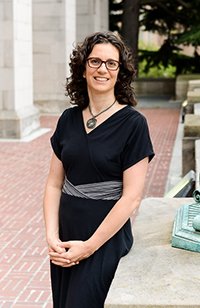 |
Our winter newsletter provides an opportunity to express gratitude to our community for generously supporting the Department of Psychology. Your support is critical to our success and impact in psychological science, the classroom, and society----thank you! I am proud to share our accomplishments with you in this newsletter, and I hope you enjoy catching up on all that is happening in Psychology.
With help from our alumni and friends, we provide more than $115,000 to support our undergraduate and graduate students each year. This student support sends our undergraduate and graduate students to professional conferences, provides opportunities to pursue independent research questions, and recognizes excellence in writing, teaching, and science. This year we are proud to announce the inaugural Barbara Sarason Endowed Fellowship for Graduate Students, a generous gift to Psychology from Emeritus Professor Irwin Sarason in honor of his late wife and our former faculty colleague. With your support, we can attract and nurture the best and brightest students from a wide variety of backgrounds and life experiences to produce the world’s most innovative scientists, clinicians, and much more. Indeed, our undergraduate majors are recent recipients of UW’s highest honors including the Sophomore Medal, the Aker’s Scholarship, the Bonderman Fellowship, the Husky 100 Award, and the President’s Medal. Our graduate students publish papers in premier scientific outlets, and are the recipients of numerous fellowships and awards, including those from the National Institute of Health, the National Science Foundation, and the Ford Foundation.
Your support also plays a significant role in attracting and retaining the world’s best faculty talent. This winter quarter, we welcome Assistant Professor Cynthia Levine, a social and health psychologist who investigates health disparities, and who will bring a new course on this topic to our undergraduates. I am also proud to announce that we have launched the Dr. Marsha M. Linehan Endowed Chair Campaign to fund a faculty position honoring the legacy of Professor Linehan, whose groundbreaking research has shaped the face of how we treat complex mental health issues and those at risk for death by suicide. Our goal is to complete this campaign by the end of spring quarter when we celebrate Dr. Linehan's career at her retirement ceremony. Our faculty are leaders in their scientific fields, and are regularly recognized with professional leadership positions and honors. This past year was particularly special in that Associate Professor Kristina Olson was named both the Waterman Award recipient and a MacArthur Fellow. The Waterman Award recognizes the best early career scientist in the nation, and Dr. Olson is UW’s first professor to ever receive this award. The MacArthur Award is commonly known as the “genius grant.” Additionally, Professor Tony Greenwald won the Golden Goose award from the American Association for the Advancement of Science (AAAS) for his implicit bias research. Finally, Professor Geoffrey Boynton received an NSF grant that will bring a state-of-the-art three million dollar MRI machine to UW to enhance our scientific community’s ability to produce cutting-edge neuroimaging research. We’re so proud of all our faculty accomplishments and UW Psychology's contributions to science and society.
Please consider making a gift to the Friends of Psychology so we can continue to advance our educational and scientific mission, and make advances that benefit our local, national, and global communities. If you would like to discuss how you can play a role in supporting our department, my door is open.
Featured Articles
Faculty Spotlight: Kristina Olson is awarded a "Genius Grant" from the MacArthur Foundation.
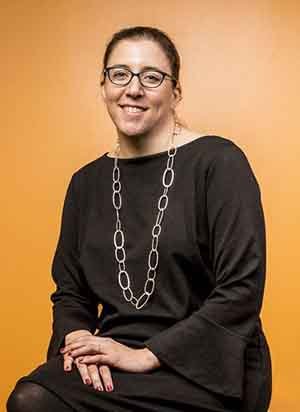 |
| MacArthur Fellow Kristina Olson |
In October 2018, the John D. and Catherine T. MacArthur Foundation awarded UW Associate Professor of Psychology Kristina Olson one of the 2018 MacArthur Foundation’s fellowships or “genius grants”. Professor Olson was recognized for advancing the scientific understanding of gender and shedding light on the social and cognitive development of transgender and gender-nonconforming youth. Dr. Olson was one of twenty-five winners to receive the 2018 MacArthur Foundation fellowships, which is awarded by the foundation to “talented individuals in a variety of fields who have shown exceptional originality in and dedication to their creative pursuits.”
With the MacArthur grant, Professor Olson will receive a $625,000 “no-strings attached” stipend from the MacArthur Foundation. Dr. Olson is currently conducting the first large-scale, national, longitudinal study of socially-transitioned transgender children and is now expanding her work to include other gender nonconforming groups. Dr. Olson recently told UW News that she “hopes to use some of the money to support underrepresented students in science, or to take on riskier projects”.
Since the establishment of the award in 1981, the MacArthur Foundation has awarded almost 1000 people with this prestigious fellowship. Dr. Olson joins a prestigious group of 11 other MacArthur fellows who have won the award while at the University of Washington.
Earlier this year, Dr. Olson became the first psychologist to receive the National Science Foundation’s prestigious $1 million Alan T. Waterman award. Professor Olson is the first UW faculty member to receive the Waterman Award in its 43-year history and the first woman to win it since 2004.
Cristian Rivera-Nales Named Chandler Scholar
"Through the knowledge that I have gained from my multi-disciplinary classes at the University of Washington, I've become familiar with the adversities that those from impoverished communities - especially children - face. I want to become a pediatric clinical psychologist to better assist those with mental health problems in these communities."
- Cristian Rivera-Nales
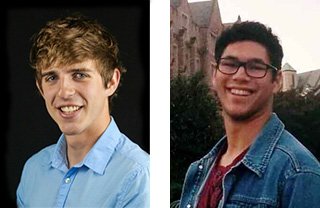 |
| Aric Channdler Cristian Rivera-Nales |
This fall, numerous psychology majors applied to become the 2018-19 Aric Chandler Scholar. Applicants were asked to demonstrate their interest in child or adolescent psychology by outlining their relevant volunteer, research, work, or personal experiences, as well as their educational and career goals. The recipient of this year's $4,000 Aric Chandler Memorial Scholarship is psychology senior Cristian Rivera-Nales.
In 2016, Aric Chandler had been admitted to UW as a transfer student from Bellevue College and was on the way to fulfilling his dream of studying psychology here. Just days after being admitted, that dream was cut short when Aric died unexpectedly from SUDEP (Sudden Unexpected Death in Epilepsy). What did not die on that day was Aric's passion and commitment to working with adolescents. Aric's parents, David and Kacee Chandler, along with his family members and friends, established an endowment to keep Aric's dream alive by providing support for transfer psychology majors who plan to work with children and adolescents.
Cristian Rivera-Nales transferred to UW from Pierce College in winter of 2018 and is pursuing a Bachelor of Science in psychology. A member of the rigorous departmental honors program, Cristian works with Psychology Associate Professor Shannon Dorsey. The research he is involved in aims to identify plausible and sustainable implementation practices that assist lay counselors in Kenya in delivering trauma-focused cognitive behavioral therapy to children who have experienced a traumatic event. "Global mental health is a relatively new field that has focused mostly on the disparities in access to mental health services in developing nations to provide feasible and sustainable services," explains Cristian.
"Because Aric overcame his own difficult struggles with anxiety as a teenager, his passion was helping young people overcome their challenges and fulfill their life's potential," says David Chandler, who continues, "this endowed scholarship will help dozens of psychology students continue Aric's life's work and passion, who will in turn impact the lives of thousands of young people in our lifetimes and beyond." A first-generation college student, Cristian credits the support of his parents, family, and friends with allowing him to be inspired and to pursue his passion for psychology.
Reflecting on being named this year's Aric Chandler Scholar, Cristian notes that the award will assist him in multiple ways. "Not only will this scholarship benefit me financially," says Cristian, "but it will allow me to have additional time to continue my own research project and to become greatly immersed academically."
APA Research Award Supports Psycholinguistics
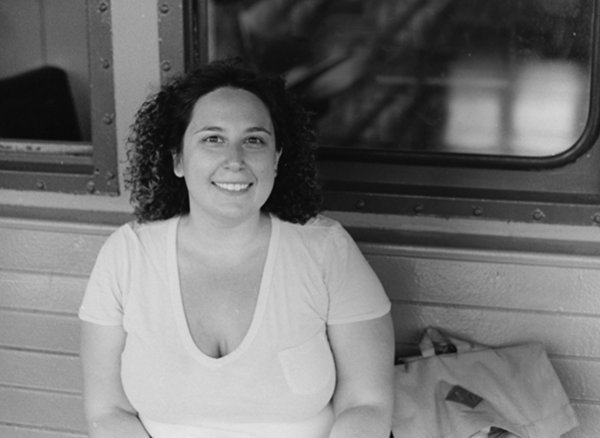 |
| Margarita Zeitlin |
Margarita Zeitlin (Cogition & Perception with Lee Osterhout) received a 2018 American Psychological Association Dissertation Research Award. The Psychology Graduate Program was very excited to hear this news and asked her some questions about how this award will help support her research and studies towards a Ph.D.!
Let's start with the basics, where are you from and where did you complete undergrad/masters?
I grew up in Brooklyn, NY and I stayed in NYC to attend New York University where I completed my B.A. in Linguistics and German.
How did you wind up at UW/why did you apply here? What do you think about living in Seattle?
After I graduated from NYU, I volunteered at a research lab at Hunter College in New York for one year and then moved to Boston, where I spent four years working as a lab manager and research assistant at Harvard University and Tufts University. Having lived my entire life on the East Coast up to that point, I was itching for an opportunity to give the West Coast a try. UW is an absolute intellectual powerhouse in psychology and language research, and I was also attracted by the opportunities in industry available in Seattle, so applying here was a no brainer. As a New Yorker, I often get asked what I think about the “Seattle freeze” and the aggressive passive-aggressiveness, but I don’t know that I feel either of those things very strongly. What I do know is that Seattle feels like a great middle ground between city and community, and there’s something about being able to see nature on the horizon most places you look that lends it all a particular majesty.
What is your research interest and how did you get into it (what inspires/motivates you)?
Over the past 10 years, I’ve studied language comprehension and language learning in children and adults using behavioral methods, eye-tracking, EEG/ERPs, and fMRI. What continues to keep me up at night is how we are able to understand each other so effortlessly. We speak at a rate of about 2-3 words per second, we only get bits of language at a time, and we don’t really know exactly what our conversational partner is going to say, yet we’re able to understand language as quickly as it comes to us. I’m interested in understanding what kind of linguistic information individuals attend to that allows them to speed language comprehension, and whether we can leverage learners’ intrinsic linguistic abilities to promote learning throughout the lifetime.
How did you learn about your funding opportunity and tell us about the application/waiting process?
I heard about the APA Dissertation Research Award from the psych-grads listserv. Applications for this award are nominated by the department and are due at the end of August. Awards are announced by the beginning of November. The short waiting period in combination with the modest application packet definitely make this an award worth applying for.
How did you feel when you learned that your application was accepted and that you will receive funding?
The APA Dissertation Research Award is the first competitive award I’ve received for my research in psycholinguistics. It was incredibly satisfying and encouraging to receive recognition for a proposal I had developed myself, and inspiring that people were excited about the applications of this work.
What is the name of your project and the funding source?
The name of the project is The role of native language comprehension in second-language learning ability. The funding source is the American Psychological Association (APA).
How might your research change the world?
Much of what we learn throughout our lifetimes depends on our ability to extract information from written or spoken language. Academic achievement is particularly contingent on this skill, especially when learning takes place in a second language. However, the way in which we extract information through language is not homogeneous and there are are systematic differences in the type of linguistic information people attend to and learn from. Given that language comprehension is a critical barrier for lifelong learning, the goal of my research is to understand how people vary in the way they process language and in turn, how it affects the way they learn. I hope this project will inform ways in which we can leverage learners’ intrinsic linguistic abilities to promote educational environments that increase learning outcomes.
Do you have any advice/tips/suggestions for others who may apply to this opportunity? About graduate study in general?
As with any grant application, it’s worth understanding what kind of research this award tends to fund. The APA website has a list of winners and their project titles and/or descriptions available to review.
One of the things I’ve learned about graduate study is that while it doesn’t get easier, it just gets harder in different ways. The good news is that this means that you’re learning and becoming more capable of dealing with bigger and different kinds of problems. It’s also important to remember that graduate school is all about training for your career, regardless of what shape it ends up taking. Ensuring that you’re getting the intellectual and skill training you want for your future will help you make the most of your graduate career and will make completing it more fulfilling along the way.
What do you hope to accomplish with the funding and/or while in the UW Psychology graduate program?
The funding I’ve been awarded will help me complete data collection more efficiently and provide me time to receive training in a complimentary EEG method to the one I am primarily using in my project. I hope to conduct this additional analysis on my dissertation data and become a more competitive applicant for comprehensive training in this method in the future.
What do you like doing in your spare time?
What spare time? (I know, oldest joke there is.) When I have the time, I enjoy trying out new recipes in the kitchen, developing film in the bathroom, and growing vegetables in the garden.
The last book and/or movie you saw and enjoyed?
I really love this book called Crap Taxidermy, which is a collection of some of the worst and most hilarious taxidermy there is. There are also instructions on how to do your own mouse stuffing, but I’ve yet to get any BNS students on my side for that craft project.
What do you plan to do once you complete your PhD?
Nap and travel. I’m not sure if I’ll end up pursuing a position in academia or in industry, but I’ve really enjoyed my teaching opportunities and I know I will definitely continue teaching in some capacity when I complete my PhD.
Supplemental Reading:
- More information on the APA Dissertation Research Award can be found online.
- Grants and Funding Information Service (GFIS) through the UW Libraries.
2019 Allen L. Edwards Public Lecture Series
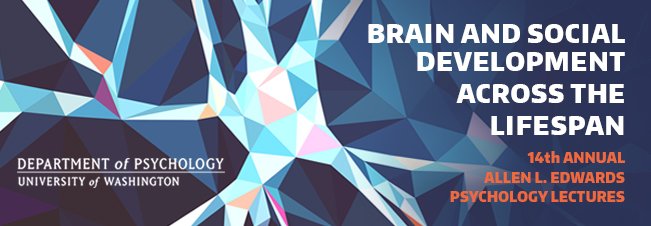
Join us for the 14th Annual Allen Edwards Psychology Lectures! Registration is now open HERE.
Two UW Psychology professors partner with distinguished visiting scholars to share their innovative research, and its implication in our everyday lives, with the community.
This free, public series is made possible by generous bequests from Professors Allen L. Edwards and Roger B. Loucks.
One of the most interesting forms of plasticity observed in the brains of adults is neurogenesis, the birth of new brain cells. Professors Brenowitz and Hen will discuss their studies of neurogenesis in adult birds and rodents, and the potential for exploiting plasticity for the treatment of damaged human brains.
Wednesday, April 24 | 7:30 - 9:30 PM
Kane Hall 130
Eliot Brenowitz, PhD, University of Washington
Professor of Psychology and Professor of Biology
René Hen, PhD, Columbia University
Professor of Psychiatry, Neuroscience, Pharmacology and Director, Division of Integrative Neuroscience, New York State Psychiatric Institute, Research Foundation for Mental Hygiene
Social Learning from the Crib to the Classroom
Recent research provides critical insights into early learning: learning starts from birth and is inherently social. Professors Sommerville and Kushnir will discuss the nature of early social learning from infancy through the preschool years, along with important lessons for parenting and education.
Wednesday, May 1 | 7:30 - 9:30 PM
Kane Hall 130
Jessica Sommerville, PhD, University of Washington
Professor of Psychology and Associate Director for Social, Emotional and Cognitive Competence, Center for Child and Family Well-Being
Tamar Kushnir, PhD, Cornell University
Associate Professor in Child Development and Director, Early Childhood Cognition Laboratory
This free, public series is made possible by generous bequests from Professors Allen L. Edwards and Roger B. Loucks.